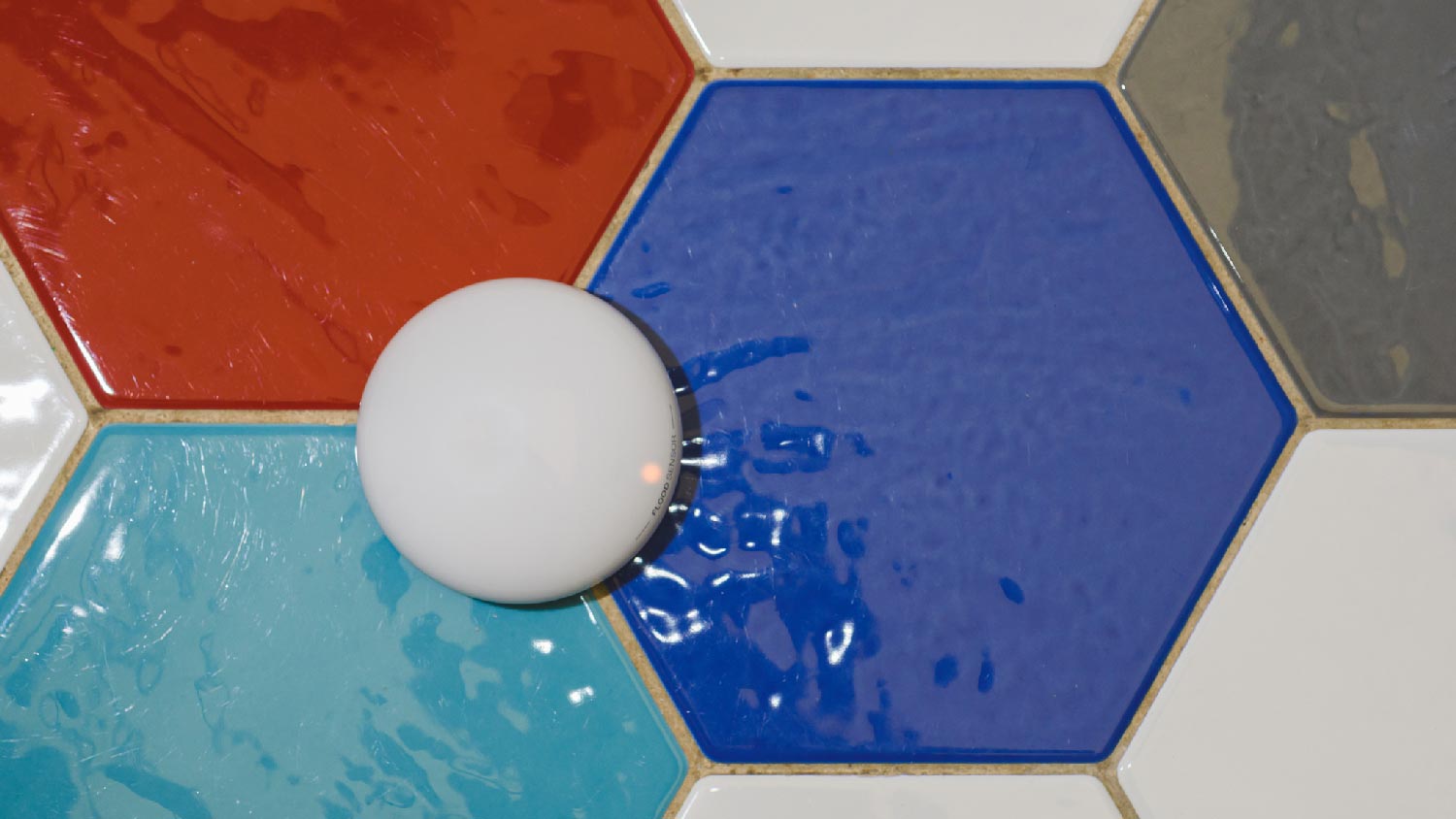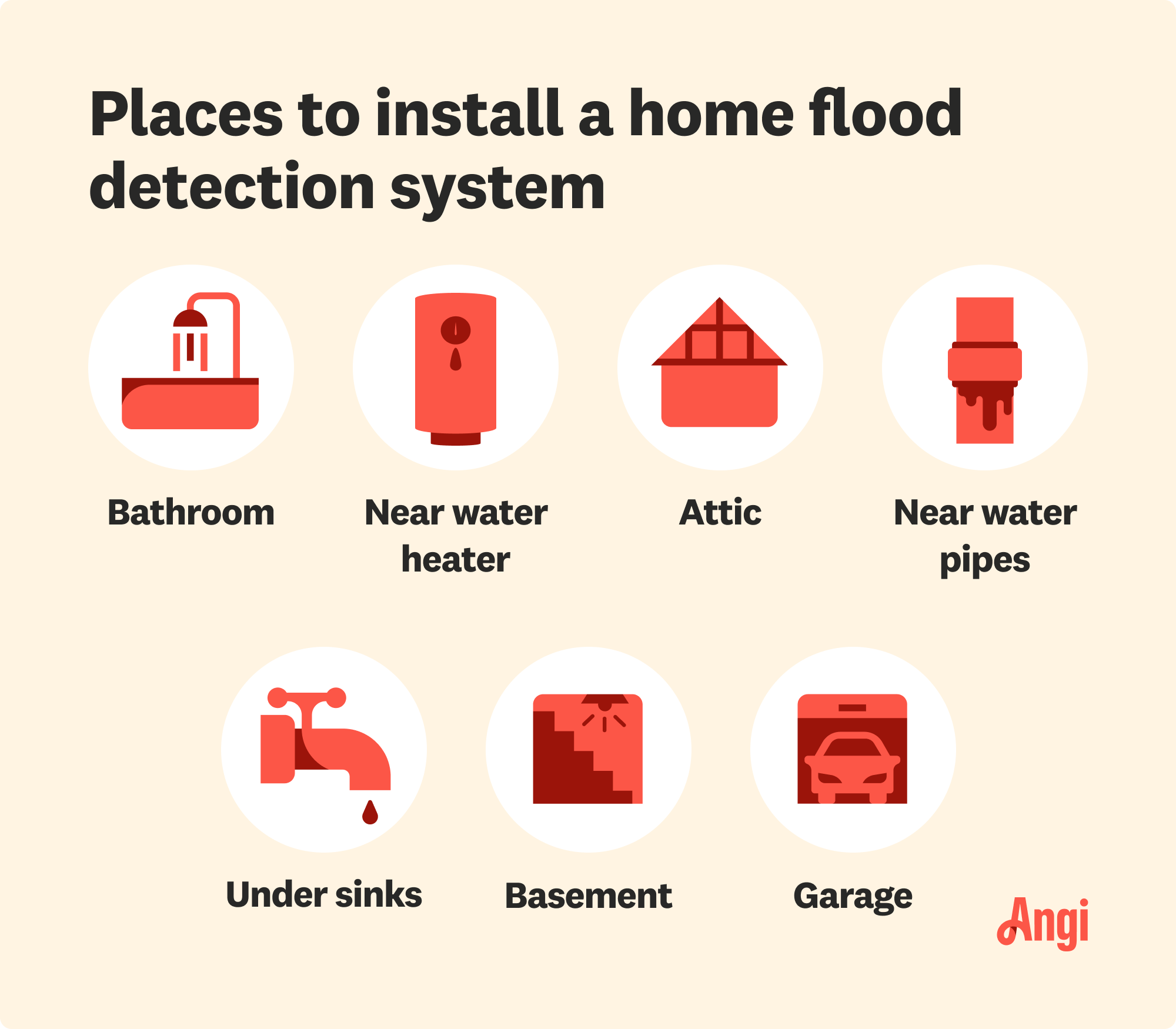What Is a Home Flood Detection System?
A home flood detection system can help keep your home high and dry


Home flood detection systems can warn you of a water leak.
Some systems can shut off your water supply to reduce damage.
Install flood detectors around areas like sinks, washing machines, or drains.
Leaks, burst pipes, and overflows can all cause water damage, increased utility bills, and high repair costs. By installing a home flood detection system, you can take a significant step toward mitigating that possibility. This guide covers how these systems work and how they can prevent water from creating costly damage in your home.
How Does a Home Flooding System Work?
A home flood detection system, also called a water leak detection system, is a device that informs you of sudden increases in moisture in your home. When the system’s sensor comes into contact with water from a leak, an overflow, or a flood from outside, it alerts with an audible beep or tone. Some advanced systems can send notifications to your phone or computer or connect to a home security system.
If you can imagine what it would be like to discover a flooded basement or living room, you can see the importance of a flood detection system. Not only can these systems notify you of a leak or flood, but some can automatically reduce or shut off the water flow through your home. This emergency measure would prevent a staggering amount of water damage from occurring in the event of a pipe failure or sewage backup.
Do You Need a Home Flood Detection System?
Even if you live in a flood-proof house, your home can still be susceptible to water damage. If a leak or burst pipe occurs when you’re not around, you won’t know about it or be able to address the problem. And that’s why water damage can potentially progress to catastrophic levels.
Beyond the damage a flood can cause, such as warped flooring, peeling paint, and structural weakness, excess moisture can promote the growth and spread of mold. Mold can sicken you with long-term exposure, leading to adverse medical conditions like rashes and lung irritation.
However, water damage isn’t the only concern. According to the U.S. Environmental Protection Agency (EPA), the average household wastes as much as 10,000 gallons of water annually due to leaks. You could wonder why your water bill is sky-high while your pipes or fixtures leak water and money.
A home flood detection system would help prevent these issues. You would have an advanced warning about leaks and floods before mold can grow, your home’s structure takes significant damage, or your water bill increases.
Types of Home Flood Detection Systems

The systems for helping prevent flood damage can vary based on your needs. All of them will warn you of the presence of excess moisture. However, they differ in what they do once you’ve received a warning.
Flood Sensor: A flood sensor is the simplest device that you could choose. You set it up where a leak could occur, and it alerts when it senses moisture. The alert can be as simple as a beep or chirp, a notification on your mobile device, or the sensor could even alert a home security system and service.
DIY Leak Detector: If you’re interested in the DIY route for keeping floodwater out of your home, installing a leak detection system with a simple motor is one option. When it detects a flood, it can open or close water valves to mitigate damage. Installing one requires technical knowledge about plumbing and water systems, so call a pro to ensure the job is done safely and effectively.
Flood Detection System via the Water Main: A professionally installed flood detection system can connect directly to your house's water supply, with widespread control over the entire supply or individual nodes and appliances. When these systems detect a leak or flood, they can shut off the water entirely and inform you about it.
Where to Install a Home Flood Detection System

When debating the best place to install a flood detection system or water sensor, consider how many water sources exist in your home. Placing one on every water source would be ideal, but here are the areas of the home that are susceptible to leaks and floods:
Bathroom: Your toilet, sink, or bathtub could overflow if you flush the wrong thing or forget about a running faucet.
Water heater: An older water heater can develop a leak as it breaks down. A leak detector can alert you, allowing you to repair or replace the water heater before the damage progresses.
Attic: If your roof sustains damage or wears down, you could see a leak during the next storm. A water detection system can warn you of a leak early on, so if you already know how to fix a leaking roof, you can solve the issue before it affects the structure of your roof or attic.
Garage: Just as a damaged roof can let water into your home, a damaged garage door can do the same during a bad storm. A water sensor is more vital for this area if your water heater or laundry setup is in the garage.
Under sinks: A burst pipe in your kitchen, bathroom, or utility sink can cause a catastrophic amount of water to enter your home. These are the areas where quick, decisive action can be the difference between a heavy mopping job and a day spent reviewing a water damage remediation checklist.
Near water pipes: The water in your house travels through a network of pipes, many of which you can’t see because they’re in your walls or floors. If one of these pipes bursts, you may not know about it until visible water damage occurs, at which point the repair bill can become hefty.
Basement: As the lowest point in your house, the basement is closest to underground sources of water and even sewage. In addition, many basements contain drainage pipes or utility sinks that can back up during heavy rains or construction work.
If you live in a flood-prone area, a home flood detection system is vital for protecting your home from water damage. The best time to install one isn’t after you’ve experienced extensive water damage or an unpleasant surprise on your water bill but well before a leak or flood occurs. A local basement waterproofing pro can advise you on the best places for water sensors or help install a flood detection system.















